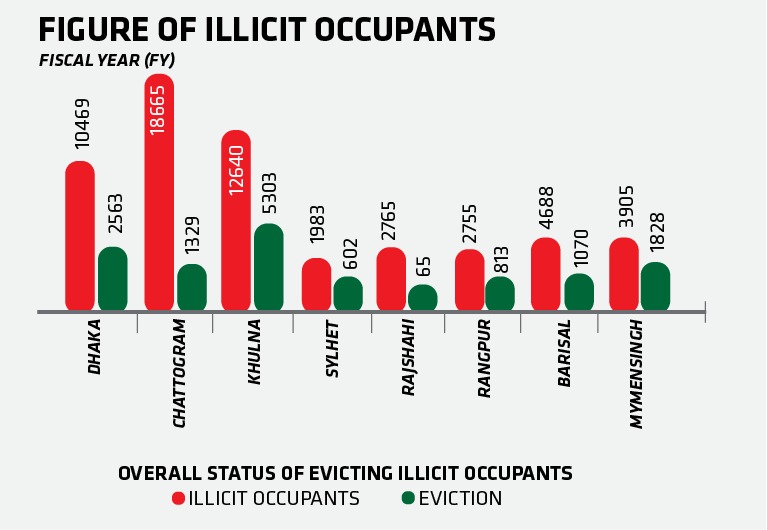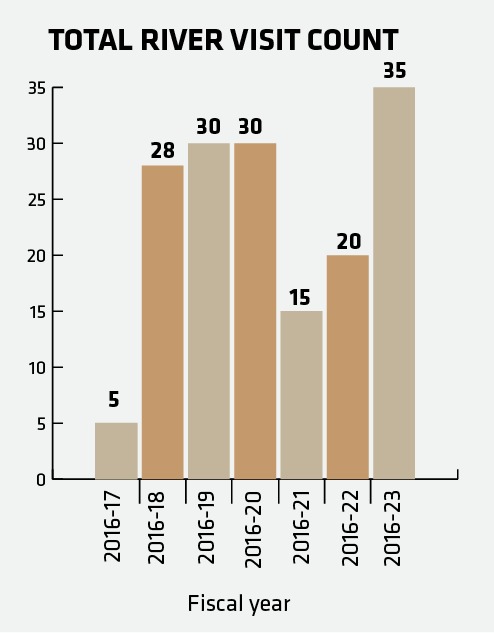Key highlights:
- Till now, across the entire country, 57,862 illegal squatters were identified, and, 13,564 of them have already been evicted.
- In the year 2022, the district administration of 46 districts managed to evict 7,725 illegal squatters.
- A hotline, with the short code ‘16124,’ has been set up for reporting complaints about river encroachments, pollution, and sand mining.
- Lists of polluters have been received from approximately 53 District Commissioners and all divisional offices of the Department of Environment.
With its extensive river networks, Bangladesh stands out as a riverine and maritime country, graced by the presence of the world’s most exquisite mangroves and the lengthiest unbroken sea beach. Among all listed rivers and streams, our country exhibits the highest density of population and watercourses per square kilometer. Nurturing these rivers and water bodies is crucial to sustain our large population and reduce living costs.
You Can Also Read: PM Sheikh Hasina’s Directive: Save Rivers
The judgment order issued in Writ Petition No. 3503/2009 by the High Court aimed to curb the construction of unauthorized structures, including the illegal occupation of riverbanks, foreshores, and floodplains. The overarching goal was to preserve the environment and biodiversity.
In response to this imperative, the government enacted the ‘National River Protection Commission Act-2013 (NRPC).’ To mitigate the risk of unlawful river encroachment, water and environmental pollution from industrial activities, illegal structure construction, and various irregularities, as well as to promote the multi-dimensional utilization of rivers for socio-economic development, including the restoration of natural river flow, proper maintenance, and navigability, the National River Protection Commission Act of 2013 was enacted.
The major roles of the NRPC Act include:
- Providing recommendations to the Government on preventing the illegal encroachment and re-encroachment of rivers.
- Offering recommendations to the Government for the eviction of illegal structures erected on rivers and riverbanks.
- Providing recommendations to the Government on maintaining river water free from pollution.
It is under the provisions of this law that the National River Protection Commission was formally established on August 5, 2014. The establishment of the Commission was made possible through the kind approval and strong leadership of the Honorable Prime Minister Sheikh Hasina.
Till now, across the entire country, 57,862 illegal squatters were identified, and, 13,564 of them have already been evicted with the assistance of the district administration. The ongoing process involves the eviction of the remaining illegal occupiers.

Resolute Moves to Oust Illegal Constructions around the Country
12.08 acres of land that was illegally occupied by Anlima Petroleum Limited on the banks of the Meghna River at Ghazaria in Munshiganj has been successfully reclaimed, leading to the closure of the plant.
Efforts to prevent the illegal leasing of Deonai in Nilphamari district, involving the construction of dams, fisheries, and reservoirs, have been effective. The areas designated as reservoirs have been safeguarded through strategic damming at various points along the river.
The unlawful lease of Mahananda River land in Chapainawabganj has been nullified. Furthermore, structures adjacent to Sheikh Russell Bridge have been demolished, and proactive measures have been implemented to thwart any attempts to encroach upon Rangamati Lake.
Successful eviction of illegal constructions along the Halda River has been accomplished, effectively putting an end to erosion in that area.
In the year 2022, the district administration of 46 districts managed to evict 7,725 illegal squatters.
Through eviction measures, 0.0103 acres of land and 118 illegal structures in North Gobindpur Mauza of Burichong Upazila, under Comilla District, have been reclaimed.
In alignment with the National River Protection Commission’s recommendation, the Water Development Board has restored the normal flow of a 1.2 km canal by removing illegal encroachments in the government canal at Patikhalghata Union in Kathalia Upazila, Jhalkathi District.
The Directorate of Environment in Dhaka City has fined and punished 279 individuals, while Rangpur Divisional Office has penalized 14 people, and Sylhet Divisional Office has taken action against 33 individuals. Altogether, 380 illegal encroachers and 1072 unauthorized structures have been removed from the Navganga River under the Narail district.

Steps Initiated to Curb Unauthorized Sand Exploitation
The unauthorized extraction of sand outside the Hilsa sanctuary and Balu Mahal of the Padma-Meghna River in Chandpur district has been halted. Consequently, Hilsa fish and other species are now available even during the winter season.
In Roumari Upazila, located in the Kurigram district, illegal road construction along the Brahmaputra River has been discontinued. Measures have been taken to cease the encroachment on river land and the illicit extraction of sand.
A mobile court intervened to impound sand mining machinery, effectively putting an end to the unlawful sand mining activities, in Gaibandha district.
The illicit extraction of sand from the vicinity of Machulia Bridge in Habiganj has been brought to a halt.
Thanks to the intervention prompted by the application submitted by local residents in Singair Upazila of Manikganj, the unauthorized extraction of sand from the Dhaleshwari River in Manikganj has been successfully prevented.
National Push to Cleanse Rivers and Raise Awareness
The National River Protection Commission has forwarded a syllabus to the Ministries of Shipping, Information, Cultural Affairs, Primary and Mass Education, as well as to the Departments of Secondary and Higher Education, and Technical and Madrasa Education. This initiative aims to facilitate the incorporation of river-related subjects into the textbooks from Class III to XII. Consequently, river-related topics have been integrated into the curriculum to enhance public engagement in river protection.
To facilitate the reporting of complaints and information regarding illegal encroachments of rivers, pollution, and sand mining, a hotline number has been established. The hotline’s short code is ‘16124.’
Of the nine short-span bridges constructed by LGED over the Kaliganga and Dakua rivers in the Kushtia district, three bridges have undergone revisions, while the remaining six bridges are currently in progress.
The dam obstructing the flow of water in the Teka River, located in Abhaynagar Upazila of Jessore district, has been successfully removed.
The Jhalakathi Municipal Corporation has discontinued the practice of depositing waste into the Sugandha River within the Jhalakathi district.
The ongoing process of compiling a list of polluters of rivers, canals, and reservoirs across the country has progressed. Lists of polluters have been received from approximately 53 District Commissioners and all divisional offices of the Department of Environment. Consequently, letters have been dispatched to all regional directors of the Department of Environment to assess the progress in curbing pollution.
With each reclaimed acre, halted encroachment, and ceased illegal activity, Bangladesh is not just cleansing its rivers; it is forging a sustainable legacy for the generations to come. The collective efforts showcased in these initiatives not only mitigate environmental risks but also contribute to the overall well-being of the nation. The journey to river preservation is ongoing, and as these endeavors persist, Bangladesh stands as a testament to the profound impact that dedicated action can have on safeguarding the lifelines of a nation.


